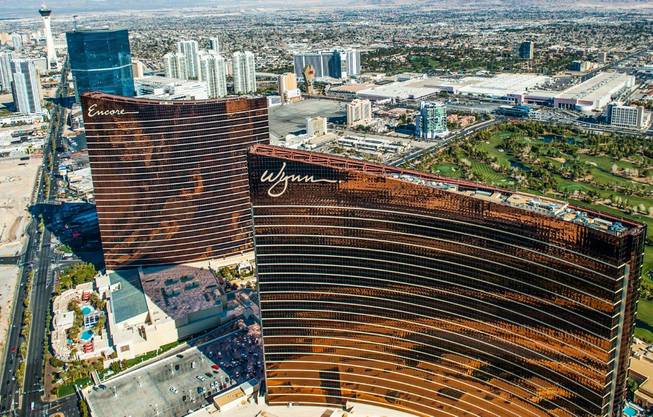
Tom Donoghue / DonoghuePhotography.com
A view of Wynn Las Vegas and Encore taken from a Maverick Helicopter on Wednesday, Jan. 16, 2013, above the Las Vegas Strip.
Tuesday, May 12, 2015 | 2 a.m.
A few of the premier casino and resort operations on the Las Vegas Strip are one step closer to creating and purchasing their own power.
Wynn Resorts and Las Vegas Sands filed applications with the Public Utilities Commission to sever ties as customers of NV Energy, the dominant power provider in the state.
The two companies are the first resort companies to submit formal applications of exit with the PUC in what’s expected to be a string of attempts this year. Filings by MGM Resorts International and Caesars Entertainment are likely to go public in the coming days.
The news of a casino pullout first occurred last month after documents obtained by journalist Jon Ralston previewed the casinos’ plans to cut ties with NV Energy. The resorts are following in the footsteps of Nevada’s largest data storage company, Switch, which has gone through the majority of a public vetting process in the past six months. The exit hearings for Switch and others that have attempted to leave largely focus on what’s known as an exit fee. The fee is the utility’s way of ensuring that ratepayers’ bills will not increase due to the exit of a customer. NV Energy says Switch should pay $28 million to leave. The data company says it should pay around $17 million.
The PUC will announce Switch’s exit fee by the end of the month.
A 2001 law allows companies that consume more than 1 megawatt per year to purchase power from other producers. The average Super Wal-Mart consumes about three quarters of a megawatt per year. Switch consumes 34 megawatts. Since the policy became law, handfuls of resort and gaming companies have attempted to cut ties with NV Energy. But none of the state’s significant players have done so. Some estimate that a departure of Switch and the gaming companies could mean a 10 percent reduction in NV Energy’s demand. The utility uses its own computing system to determine an exit fee. Private companies do the same. The PUC ultimately decides what the proper fee will be.
Lawmakers passed the law at a time before fracking spurred a domestic energy boom that has recently cut prices in traditional fossil fuel markets that utilities use to purchase energy. In 2001, the law passed with support of NV Energy and GOP Gov. Kenny Guinn. Energy prices were high and Nevada had little infrastructure to meet a population increase that was booming at the turn of the 21st century.
But now the scenario is different. Nevada, with more than 300 days of sunshine per year, is trying to tag itself as one of the world’s solar energy capitals. Companies like Switch have vowed to go 100 percent “green” and are using the law as a way to meet that goal. Casinos like MGM have already made a major solar investment on some of its Strip properties and are willing to pay a big upfront cost as a way to buy and create energy for a lower price than what it’s currently paying.
In its filings, the Sands said it has begun a bidding process to choose new power providers at its facilities on the Strip. Much of the resorts' proprietary information remains confidential on the PUC docket.

Join the Discussion:
Check this out for a full explanation of our conversion to the LiveFyre commenting system and instructions on how to sign up for an account.
Full comments policy